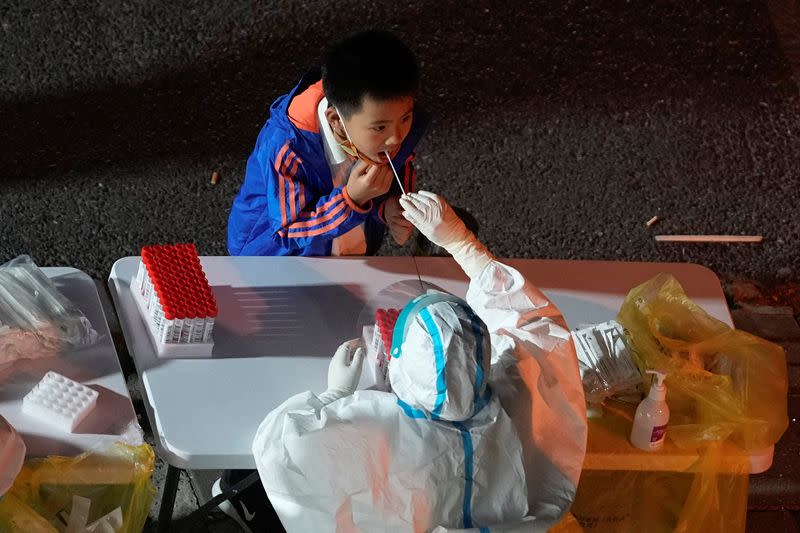China’s stock markets jumped on Friday after the new Politburo eased some of its draconian Covid rules.
The Politburo Standing Committee meeting, chaired by President Xi Jinping, shortened quarantines by two days for close contacts of infected people and for inbound travellers. It also removed a penalty for airlines that bring in many cases.
Hong Kong’s Hang Seng Index soared by over 7% on Friday, while Shanghai’s benchmark CSI 300 jumped by 3% and the yuan currency extended gains to a one-month high.
Under the new rules, centralised quarantine times for close contacts and travellers from abroad were shortened from seven days to five days. The requirement for three further days in home isolation after centralised quarantine remains.
China will also stop trying to identify “secondary” contacts – a major annoyance for residents of cities who find themselves caught up in sweeping contact-tracing efforts when a case is found, but will still try to identify close contacts.
“Optimising and adjusting prevention and control measures is not relaxing prevention and control, let alone opening up and ‘laying flat’, but to adapt to the new situation of epidemic prevention and control and the new characteristics of Covid-19 mutation,” the National Health Commission (NHC) said.
China is also adjusting its categorisation of Covid risk areas to simply “high” and “low” risk – eliminating the “medium” category, an effort to minimise the number of people coming under control measures.
The NHC also said it would develop a plan to accelerate vaccinations, which experts say is widely needed before the country can begin more fully dialing-back of its zero-Covid policy, which has made China a global outlier and inflicted significant economic costs.
ALSO SEE:
US Crackdown on China ‘Slave Labour’ Blocks Solar Projects
Over 2,800 Cases in Guangzhou
The easing of rules comes even as case numbers surge to their highest in months, with Beijing and the central city of Zhengzhou seeing record tallies.
Authorities reported 10,535 new domestically transmitted cases for Thursday, a low number by global standards but China’s highest number since April 29, when the commercial hub of Shanghai, was battling its most serious outbreak under strict lockdown.
The southern city of Guangzhou – a manufacturing and transport hub and the new epicentre of China’s Covid fight – reported 2,824 new local cases for Thursday, the fourth day in which infections exceeded 2,000.
Driving the surge were cases in the populous Haizhu district, which on Friday extended a lockdown until Sunday. At least three of Guangzhou’s 11 districts have been put under some sort of restriction.
“All residents are required to stay at home,” the district government said in a statement. “Only one person in each household is allowed to buy daily necessities on a staggered schedule.”
All public transit in the district of 1.8 million people has been suspended, and mandatory PCR tests will be administered to “every household and every individual”, it said.
Will Zhang, 30, a post-graduate student, said universities in Guangzhou have been put under curbs, including a sprawling university town in Panyu district with more than a dozen institutions and a population of more than 300,000.
“Since yesterday, campuses located inside the Guangzhou University Town have been under a lockdown where people are only allowed to leave but not enter,” Zhang said.
Cranes Used to Deliver Food to Students
In some cases, construction cranes have been used to deliver food to students locked in multi-storey dorms, he said.
Beijing, Zhengzhou and Chongqing also tightened measures as daily cases rose to around all-time highs.
Zhengzhou, capital of central Henan province, reported 2,988 new cases, more than double from a day earlier, in a widening outbreak that has thrown an iPhone assembly plant of Apple supplier Foxconn into chaos.
In the southwestern metropolis of Chongqing, cases remained in the triple digits all week, with a new high of 783 on Thursday. Some districts on Friday banned dining at restaurants and some subway stations were closed.
Beijing reported a record 118 new domestic cases for Thursday, which is still low compared with other Chinese cities.
Authorities in many parts of the city of nearly 22 million people have urged residents to take daily PCR tests, or be barred entry to public spaces including offices, leisure venues and fitness centres.
Sanya, a beach resort city in the southern island province of Hainan, said it would launch a round of mass testing on Saturday.
“This meeting further illustrates policymakers have started to focus more on optimising the Covid control policies,” Goldman Sachs said in a note following Thursday’s Politburo Standing Committee meeting but before Friday’s announcement.
“We continue to expect policymakers to start preparation work for the gradual relaxation of the ‘dynamic Zero Covid’ policy stance while the actual relaxation might only begin by the second quarter next year.”
- Reuters with additional editing by Jim Pollard
ALSO SEE:
US Business Sentiment in China at Record Low, Survey Shows
Companies Battle on as Covid Cases Climb in China
China Braces For Covid Wave As Foxconn Staff Flee Zhengzhou
























